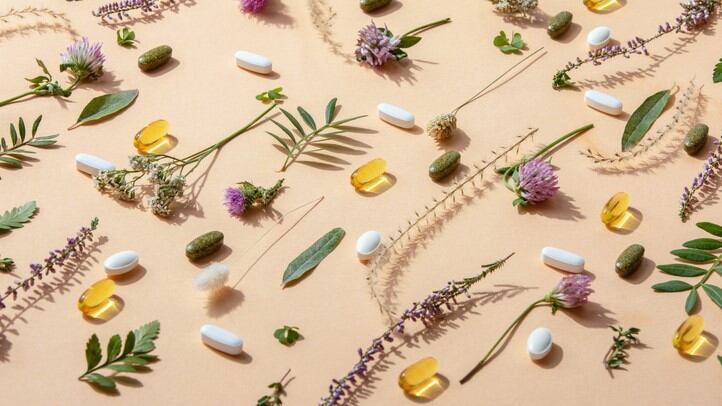1 – Sunscreen still needed: Protective surgical face masks ineffective against UV protection, says Kao
People still need to protect their skin from ultraviolet sun rays with sunscreen even when wearing protective surgical face masks, according to new research from Kao.
For the first experiment, researchers from the firm’s Beauty Research and Creation Center (BRCC) conducted the experiment on a model with ‘skin’ that turns purple when it comes into contact with ultraviolet (UV) rays.
A cream sunscreen with SPF 50+ and a triple plus protection grade (PA) was applied to half of the model’s face and protected with a standard non-woven surgical face mask.
As hypothesised, the skin underneath the mask that was not protected by sunscreen turned purple, indicating exposure to UV rays.
2 – Melanin reduction: Malaysian researchers formulate and trial skin lightening cream containing betel leaf extract on human subjects
Researchers in Malaysia have formulated a cream containing Piper betle L. extract which has shown to reduce melanin content, lighten skin tone, and improve skin elasticity among human subjects.
Piper betle L is a native leaf from Malaysia also known as sireh. Its skin lightening effect is believed to be contributed by a compound named hydroxychavicol (1-allyl-3,4-dihydroxybenzene).
Currently, most skin lightening agents are chemical based such as hydroquinone, arbutin, tretinoin and alpha hydroxyl-acids (kojic acid, gycolic acid and lactic acid). These act by inhibiting the activity of the tyrosinase enzyme, which decreases melanin production of melanin, leading to depigmenting or whitening effect.
However, these agents tend to cause adverse effects such as skin irritation and contact dermatitis. So, this has sparked interest in finding alternative skin-lightening agents from natural sources such as plant extracts, with the belief that they are safer to use than synthetic chemical agents.
3 – Beiersdorf: Digital blue light skin health concerns are ‘unfounded’
Artificial blue light from digital devices does not damage skin because the levels emitted during use are not enough to trigger harmful effects, says Beiersdorf – claims matched by a recent study from Norway.
In recent years, interest in blue light protection had soared amongst industry and consumers alike. And earlier this year, a review said ingredient launches for blue light protection and on-pack claims would surge in the beauty and personal care space as industry learned more about the mechanism of damage occurring in the skin and testing methods to verify claims evolved.
And certain big brands had already got involved in the blue light conversation, notably Unilever when it told CosmeticsDesign-Europe back in September 2020 that education on the harmful effects of blue light exposure was industry’s responsibility, particularly blue light emitted from digital devices. The personal care major said during COVID-19, 60% of consumers now spent more than six hours per day in front of digital devices, equating to 25 minutes in midday sun without protection when spread across five working days.
4 – Clean sweep: Clé De Peau’s new micellar cleansing water to feature Shiseido’s new make-up removing tech
Japanese beauty giant Shiseido has developed new technology to enhance the effectiveness of micellar water that it will launch with Clé De Peau Beauté starting from June 2021.
The latest tech will be applied to Clé De Peau Beauté Micellar Cleansing Water will be rolled out in Japan in June and will be launched subsequently overseas from July.
Clé De Peau Beauté Micellar Cleansing Water will be the first product to be enhanced with the newly developed tech and Shiseido intends to develop more cleansing products with it in the future.
The impetus of the new launch was Shiseido’s development of a unique state of surfactant, the sponge phase.
5 – Essential oils have 'enormous versatility’ as natural fragrance source in cosmetics: Review
Essential oils have seen a revival in cosmetics over the past few years and will continue to surge, appreciated for their ability to impart a wide range of natural, unique and pleasant fragrances but also pack a bioactive punch, says a review.
Writing in Molecules, a team of researchers from universities in Italy, Turkey, Vietnam and Mauritius conducted a review on the use of essential oils as natural sources of fragrance compounds for cosmetics and cosmeceuticals. The aim, they said, was to “highlight the enormous versatility of essential oils as significant sources of natural fragrances” in these categories.
According to data in the review, the €6.25bn (US$7.51bn) global essential oils market, valued in 2018, would surge at 9% CAGR between 2019-2026. And findings showed many “high-valued essential oils” were used in the cosmetics industry as fragrances, including citrus, lavender, eucalyptus, tea tree and other floral oils, among others.





